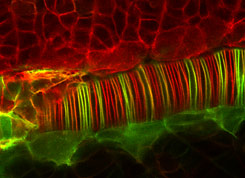Zebrafish notochord scatter-labeled with
red and green fluorescent proteins
Author Brian Ciruna
In this week’s Nature, Brian Ciruna, Alex Schier and colleagues reveal how a major cellular signaling pathway controls the formation of an embryo’s neural tube – its future spinal cord and brain. The finding may shed light on the underlying cause of common neural tube closure defects, such as spina bifida, which afflict 1 in 1,000 newborn children.
During neurulation an epithelium of neural progenitors rolls up and fuses to form the neural tube. Using zebrafish embryos, Ciruna and colleagues studied the role of the planar cell polarity (PCP) signaling pathway during neurulation. They discovered that neural progenitors located in the neuroepithelium have a head-to-tail polarity. This polarity is lost when cells divide and leave the epithelium, but polarity is restored upon reintegration into the epithelium.
Studying the movement of cells in live embryos, Ciruna et al. found that in the absence of PCP signaling neural progenitors lack polarity and after dividing cannot reintegrate into the neuroepithelium. This leads to the abnormal accumulation of cells and interferes with neurulation. Strikingly, this defect was rescued when cells were inhibited to divide. This result reveals that the PCP signaling pathway couples the process of cell division with that of polarity and tissue movement during neurulation.
Intriguingly, neural tube closure defects in curly tail mice, a genetic model for human neural tube defects, can also be modulated with agents that slow the rate of embryonic cell division. Although the nature of the curly tail mutation remains unclear, let alone the mechanism of pharmacological rescue, the results in zebrafish raise the possibility that the uncoupling of PCP signaling and cell division during neurulation might underlie neural tube defects in humans.


